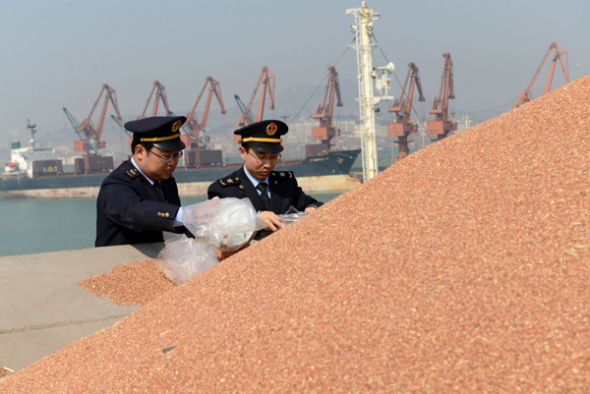
Inspectors check sorghum imported from the United States at Rizhao Port, Shandong province. (Photo: China News Service/Zhu Yuanli)
China has decided to impose provisional anti-dumping measures on grain sorghum imported from the United States, the Ministry of Commerce said in preliminary anti-dumping ruling on Tuesday.
The ministry found that U.S. companies had dumped grain sorghum on the Chinese market, and such imports had caused substantial damage to the domestic industry, after China decided to launch anti-dumping and anti-subsidy probes into U.S. sorghum in early February.
Starting on Wednesday, grain sorghum importers will be required to pay deposits with Chinese customs calculated based on a rate of 178.6 percent, according to the ministry.
Wang Hejun, head of the trade remedy and investigation bureau at the Ministry of Commerce, said the decision is in accordance with Chinese laws and WTO rules, and is aimed at correcting unfair practices to maintain a healthy trade order.
"China has always opposed abuses of trade remedy measures ... China is willing to expand cooperation with the U.S. side to reduce disagreements in the trade field," Wang said
China is a major buyer of U.S. sorghum as well as soybeans. Sorghum is also used in the Chinese liquor baijiu.
Data from the ministry showed U.S. sorghum exports to China surged from 317,000 metric tons in 2013 to 4.76 million tons in 2017, while export prices have slumped 31 percent during the period, which led to a fall in domestic prices that hurt local industries.
According to WTO rules, the government can launch the anti-dumping and countervailing investigation under two circumstances-the relevant industry applies for the investigation and the investigation is launched by the investigation authority.
Wang said China's law has similar provisions, so does the law of the other WTO members.
In addition to grain sorghum, China also started an anti-dumping investigation into imported phenol from the United States, European Union, South Korea, Japan and Thailand late last month, after receiving an application for an inquiry from domestic producers, who accuse foreign manufacturers of dumping phenol on the Chinese market at prices below their fair value.
As anti-globalization and protectionism spread, experts urged that all involved parties deal with the trade frictions through dialogue on the basis of mutual respect, equality and mutual benefit.
Xue Rongjiu, deputy director of the Beijing-based China Society for WTO Studies, said as China is opening up on a higher level and commands much leeway in foreign trade, severe trade friction would damage many countries' interests in the long-term.
"Meanwhile, supply-side structural reform and innovation campaigns have shored up the stability and resilience of the Chinese economy, and the country is capable of handling risks and challenges to maintain healthy economic growth," said Zhang Monan, a researcher with the China Center for International Economic Exchanges.


















































